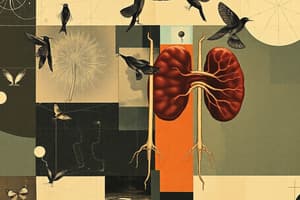Podcast
Questions and Answers
Which division of the nervous system controls voluntary movements?
Which division of the nervous system controls voluntary movements?
- Peripheral nervous system
- Somatic nervous system (correct)
- Central nervous system
- Autonomic nervous system
What is the primary role of the hypothalamus in maintaining homeostasis?
What is the primary role of the hypothalamus in maintaining homeostasis?
- Regulating body fluid balance
- Monitoring the body's internal environment (correct)
- Sending signals to the pituitary gland
- Producing and releasing hormones
What is the function of hormones in the body?
What is the function of hormones in the body?
- Controlling voluntary movements
- Transmitting sensory information
- Regulating metabolism (correct)
- Producing energy
Which gland produces cortisol to help the body respond to stress?
Which gland produces cortisol to help the body respond to stress?
What type of neurons transmit information from sensory receptors to the central nervous system?
What type of neurons transmit information from sensory receptors to the central nervous system?
Which system regulates involuntary processes, such as those involved in digestion and respiration?
Which system regulates involuntary processes, such as those involved in digestion and respiration?
What is the main function of the endocrine system?
What is the main function of the endocrine system?
Which gland is responsible for producing cortisol and epinephrine?
Which gland is responsible for producing cortisol and epinephrine?
How does the nervous system primarily communicate?
How does the nervous system primarily communicate?
Which system regulates metabolism and energy production?
Which system regulates metabolism and energy production?
What is the main difference between the endocrine and nervous systems?
What is the main difference between the endocrine and nervous systems?
Which gland is NOT part of the endocrine system?
Which gland is NOT part of the endocrine system?
Study Notes
Control and Coordination: Understanding the Endocrine System and Nervous System
Our bodies are complex machines, constantly maintaining a delicate balance to sustain life. Control and coordination are essential processes that oversee and regulate these intricate systems. To delve deeper into these mechanisms, let's explore the roles of the endocrine system and the nervous system, as well as the concept of homeostasis and hormones.
The Endocrine System
The endocrine system is responsible for releasing hormones into the bloodstream, where they act as chemical messengers, signaling cells, tissues, and organs to regulate their activities. These hormones originate from specialized cells, collectively referred to as glands. The endocrine system consists of eight primary glands:
- Pituitary gland
- Thyroid gland
- Parathyroid glands
- Adrenal glands
- Pancreas
- Ovaries (in females)
- Testes (in males)
Hormones serve diverse functions, such as controlling growth, metabolism, and reproduction. For instance, the thyroid gland produces thyroxine and triiodothyronine, which regulate metabolism and energy production, while the adrenal glands produce cortisol and epinephrine, which help the body respond to stress.
The Nervous System
In contrast to the endocrine system, the nervous system communicates via electrical signals transmitted through nerve cells, also known as neurons. The nervous system is made up of two major divisions: the central nervous system (CNS) and the peripheral nervous system (PNS).
The CNS consists of the brain and spinal cord, which serve as the primary processing centers for our senses, thoughts, and motor functions. The PNS includes sensory neurons, which transmit information from sensory receptors to the CNS, and motor neurons, which transmit information from the CNS to muscles and glands.
The nervous system is divided further into two subsystems: the somatic nervous system and the autonomic nervous system. The somatic nervous system controls voluntary movements, such as those involved in walking, while the autonomic nervous system regulates involuntary processes, such as those involved in the digestive, cardiovascular, and respiratory systems.
Homeostasis
Homeostasis is the body's ability to maintain a stable internal environment, despite fluctuations in the external environment. This constancy is essential for the proper functioning of our cells, tissues, and organs.
The endocrine and nervous systems work together to maintain homeostasis. For example, the hypothalamus, a region in the brain, monitors the body's internal environment and sends signals to the pituitary gland to produce and release hormones, such as antidiuretic hormone (ADH) and thyroid-stimulating hormone (TSH), which help regulate body fluid balance and metabolism, respectively.
Hormones
Hormones are chemical messengers produced by the endocrine glands that regulate various body processes, such as growth, metabolism, and reproduction. Hormones are released into the bloodstream, where they travel to target cells and tissues to exert their effects.
For example, the thyroid gland produces thyroxine (T4) and triiodothyronine (T3), which regulate metabolism and energy production. The adrenal glands produce cortisol, which helps the body respond to stress, and epinephrine (adrenaline), which helps the body prepare for the fight-or-flight response.
Hormones act on target cells and tissues through specific receptors, which are proteins embedded in the cell membrane or intracellular compartments. When a hormone binds to its receptor, it triggers a series of events within the cell, such as gene expression, protein synthesis, or enzyme activation, leading to the desired physiological response.
Understanding the endocrine system, the nervous system, homeostasis, and hormones helps us appreciate the complex interplay of these systems as they work together to keep our bodies healthy and functioning optimally. As a result, we can better understand the intricate balance of control and coordination that allows our bodies to maintain health and wellness.
Studying That Suits You
Use AI to generate personalized quizzes and flashcards to suit your learning preferences.
Description
Explore the roles of the endocrine system and the nervous system, delve into the concept of homeostasis, and understand how hormones regulate various body processes. Learn about glands, neurons, central nervous system, peripheral nervous system, and the interplay between these systems to maintain a stable internal environment.




